2023 Wrapped
Entering the Navy as a cadet (MIDS) and reflecting a ton along the way.
In the past 6 months, I’ve:
went from fighting fires to giving a talk at Google HQ within 3 hours
travelled around in two countries without a passport, legally
written over 20 essay drafts for college applications ☠️ and reflected a ton along the way.
Two weeks after writing my last newsletter, I could never have predicted that I’ll end up in the Navy. Just a sensing of how rare it is for someone to end up here (particularly as a NSF, or someone serving their two years of National Service liability): ~36 out of 1800 officer cadets are chosen every year to join the Navy as a midshipman (aka the lowest life form in the navy, a naval cadet).
I’ve attempted to condense the lessons that I’ve learnt from the experiences I’ve went through the second half of this year in this piece :). Feel free to skip around to my key takeaways, or stay for my stories of the high seas.
Content (since this is my longest post):
Knowing Seasons
One main conclusion that I’ve reached after spending close to a year out of school and in National Service is that there are seasons in life. Definitely something I knew growing up, but knowing what it truly meant was different.
Seasons to explore, to enjoy, and to simply get through. And the season that I’m in is one that I’m willing to just get through. Perhaps some may deride this line of thinking as being un-ambitious, but this line of thinking stems from the painful awareness that friends that I’ve made earlier in 2023 are living life to the fullest.
It’s straightforward to presume as an outsider that “NS is the best time to accelerate your growth”, but when you’re stuck in camp at 10pm on a Friday night with the only barrier to 48 hours of free time being the extreme standards of cleanliness that you’re never able to meet, you start to question external circumstance. And of course, it was natural to think—what are my friends overseas doing right now?
I think this thought had already surfaced in BMT (Basic Military Training, for new readers!), but the length of OCS (9 months) ingrained this feeling even deeper. They say that comparison is the thief of joy, and to stop myself from feeling that sour, I should just not compare, but it‘s not as straightforward as that.
One experience that made me reflect and reach a temporary resolution to this can be summed up in the following sentence:
Fighting fire (literally) in full BA1 suit2, and two hours later, presenting to a crowd of 400+ at Google’s HQ in Asia.
Being close to complete exhaustion and remembering that I had to present a few hours later was rather surreal. Struggling out of my firefighting gear, rushing to wash up and heading over to the tech district in Singapore barely in time to present—I can still remember that day vividly. Changing out to army attire immediately after giving my talk, traveling back to camp and lying on my bed spent (and scrolling the countless LinkedIn notifications after) was an experience too.
Looking back, this duality between training and being productive by conventional standards couldn’t have been more stark. It was a first for both events: fighting fire and speaking in front of a large crowd about designing AI applications. (slides here)
So, a month into starting cadet life, I told myself this: it would be weekdays of trial, followed by weekends of innovation. This season has taught me patience; one of navigating a chapter not fully optimised for progress but still brimming with potential. And I’ll keep plugging away with whatever opportunities I had, maximising each moment to the best of my ability.
Optimising for breadth of experiences
Some experiences, like the ones detailed below, cannot be acquired through other means (monetary or otherwise).
One thing I looked forward to when joining Navy OCS (aka MIDS Wing) was that it offered the widest range of lived experiences during my 22 months of National Service. For instance, I wouldn’t have known how claustrophobic and physically tiring it was to be in a fireman’s suit (and how important dealing with damage and fire was to a ship’s survivability).
That was just one small example; all the training we did—countless theory lessons — eventually led to our one month (28 day) deployment sail on board a Singaporean frigate.
Distant disputes were made tangible and real—they occurred right before my eyes. Sailing up to Busan from Singapore meant cutting through the South China Sea for a large part of our journey. As such, sighting warships of various countries were common.
I recall the first time I saw a warship from a different country. Now, conducting helicopter operations were complicated: it involved a multitude of steps before a helicopter could be launched, and an even trickier process to retrieve the helicopter as it was landing (on a moving ship). One such vessel conducted helicopter operations to positively identify our frigate: I saw the helicopter circling us and heading back to its mothership. Half an hour later, we had visual sighting of said vessel.3
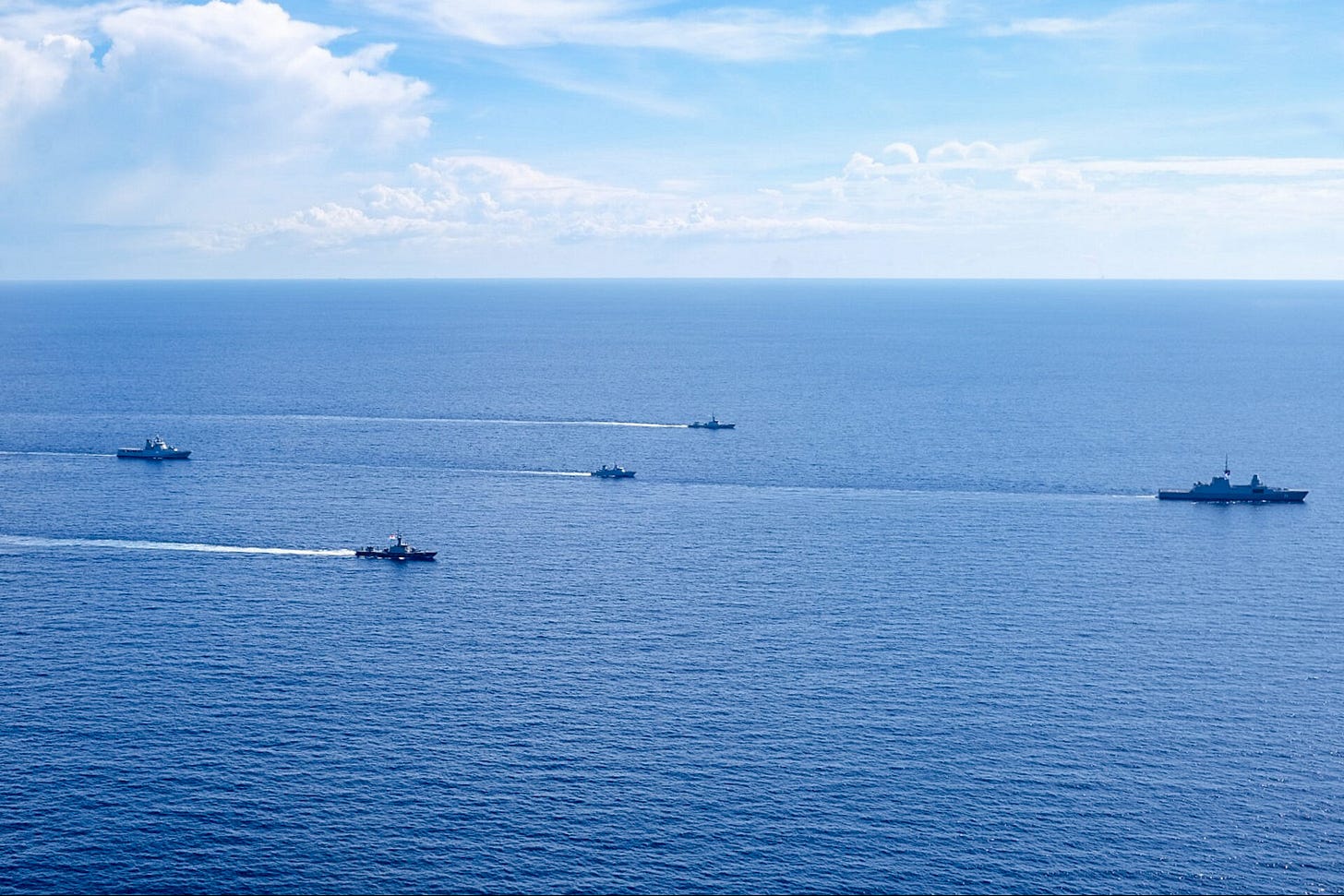
I believe it was only then that it dawned on me that it was the high seas and real operations were ongoing. There were lives at stake; countries were not treating territorial boundaries lightly.
For us, it was a training mission: mainly for the regulars (batchmates who chose the Navy as their career) to have a taster of what they would be doing in the future.
Yet around us, there were vessels duking it out on a common radio frequency at 2am in the morning4, and vessels standing watch 24/7 to protect their country’s sovereignty(who spends their Sunday mornings out on the high seas with no internet?!). For them, this was real; the implications beyond their individual ships (or crew) were profound.
This sounds good on paper, but what really went on each day is detailed below.
Back to suffering: life at sea as a cadet
This sail is notoriously known as the Midshipman Sea Training Deployment (MSTD). For ship crew and officers, they probably had some fun ridiculing how ignorant and clueless us midshipmen were. For my friends and I, we thought we knew what was in store—previous batches of MIDS had told us this was the hardest phase of midshipman training—but we didn’t know how challenging it was really going to be.
For us NSFs, there wasn’t anything on the line. Most of us weren’t gunning for scholarships, or high course rankings anyway. Still, some tried their best. Personally, I reckoned it was worth a trade off to get through MSTD rather than excel in it, since I had to submit my college applications before sailing (we sailed from 14 Oct to 11 Nov, and 1 Nov was the REA deadline).
Hence my intention for the sail was encapsulated above: maximising breadth of lived experiences. This definitely lightened how seriously I treated this sail. But it didn’t take away the fact that it was tough.
Prior to sailing
There were lots of negative emotions around the two weeks leading up to the sail, where we stayed on the ship, in harbour, for a period known as Harbour Acclimatisation (HA). For one, I thought day and night about how to optimise the most for my college essays, what edits I could have made to make the piece more authentic, etc. The few days before sailing, I was attempting to finish up my application package and send it prior to sailing. That uncertainty of both the outcome of the application, as well as what lay ahead brought about so much negativity that my mind overplayed how bad the sail was going to be.
Looking back, perhaps I spent too much time and effort optimising for something with no known means of tracking progress. 5
Sacrificing sleep and aerobic fitness was a foreshadowing of what was to come. It sucked, because what brought rest and rhythm to life in this period was taken away.
Slip off
Oh, leaving was tough.
Leaving was really tough—facing my parents (and my sister!) while the frigate slowly slipped off. It’s unlike flights, where the goodbye is rather instantaneous. We would line the deck, wait for the lines to be cast off, and would wave and wave until our parents are slowly reduced to a speck on the horizon. And it was in front of everyone, so any break of motion to wipe my tears (!) would be immediately spotted.
Leaving a place of comfort, rest and routine for the unknown (yes there’s a bit of dramatisation here) was challenging. But what I missed most was the presence of my family and support systems, going into something that I didn’t entirely sign myself up for.
Sailing, navigate me to the Prince’s port like Haiti// I believe these rocky seas will one day give way to safety ~ Trip Lee, Standby
But once the frigate left Singapore waters, that was when we had to put all these feelings behind and be zoned into the task at hand.
On sleep deprivation
20 of us slept in a cramped 24-man cabin with 2 shared showers and 3 toilets, one of which would perpetually clog up. The passageway could barely fit a person.
Out at sea, the toughest part was waking up every morning. Knowing it was going to be the same darn routine, of fighting to stay awake for the next 20 hours before I could rest again, and of getting scolded for every small slip-up possible.
Prayers got me through this part. Just an absolute plea for energy and strength to see me through the day, before bending over (I couldn’t sit up straight without hitting my head) for water.
Let me find Your light in my darkness, Your joy in my sorrow, Your riches in my poverty and Your glory in my valley ~ The Valley of Vision
And after climbing two flights of stairs, we would all stand groggily out in the open for morning mustering. Any minute later beyond the stipulated time and our course warrant would set the mustering time 15 minutes earlier. That was how it went from 6 to 4.30.
Why the fuss about little sleep, you might ask. Just sleep earlier, right? No, not really, no. We had three things to do each day: bridge watchkeeping (more on this later), firefighting and damage control (FFDC), as well as leadership development missions (aka LDMs, a fancy name for planning events). Each day ran like clockwork: wake up, morning PT, breakfast, a 3 minute presentation session (titled “180s”, supposedly for us to practise our public speaking skills), bridge watchkeeping, lunch, FFDC, dogwatch (afternoon PT), dinner, LDMs, rest/ bridge watchkeeping. It sounded simple, but there were days when we had to report to the bridge for bridge watchkeeping from 12-4am6. And wake up at 8am the same day and carry on with the schedule, as per normal. Here’s a documentary series of my senior batch (we’re 100th MIDS, the batch being filmed was 99th and they had their MSTD on a Landing Ship Tank).
Because MSTD was meant to be a training deployment, that meant that instructors could deal punishments freely for any poor performance. One that I could remember involved us waking however many minutes earlier for however many minutes that we closed up (reported, ready to take over) late at the bridge. So within the first 5 days, my group had to report at 4am, despite having finished bridge watchkeeping (and subsequent debrief) at 1am.
On sea state
Sea state was a metric to gauge how bad the conditions out at sea were. On a good day, it might be 1 (out of 10). We probably averaged 2 to 3 for the entirety of the sail.
The bad days came more frequently the further north we sailed. On days when it was atrocious, the roll (movement of the ship from side to side) would be such that when we were standing outside on the left, it would be impossible to see the sea on the right.
Everyone had different tolerance levels to bad sea state. When certain batchmates started throwing up into vomit bags, that was when we knew that conditions were getting worse. We jokingly called them “sea state indicators”. Be out at sea with a bad sea state long enough, and it’ll start messing with your gut.
Keeping calm under pressure
If there was one activity in MSTD that taught me the most, it would be bridge watchkeeping. It was on the bridge (the control centre of the ship) where decisions were made, where the command team had an all-round view of everything happening around them.
During this activity, we were assigned to different roles as midshipmen—to simulate what it would be like taking over control of the ship. The main role was the officer-of-the-watch (OOW), a person responsible for the safe navigation of the ship towards its destination. This was particularly important for the regulars (those who chose the Navy as their career), where they would have to be competent in commanding ships in the future.
During the two hours when we closed up as 2nd OOW, we were subject to heavy scrutiny by both the actual ship crew who were on duty, as well as our training officers. Every second of pause, every stumble, every slip-up in voice commands meant more shouting, more pushups and more extreme punishments meted out.
I don’t think I would’ve had a problem facing the music. Back in BMT, we were scolded probably almost every other day. But this was different: it was me, in a place of leadership, being corrected for the lack of competence; actions that I carried out no longer affected only my peers and myself, they affected the lives of the ship crew, too—who, on average, had many more years of experience than me.
So I learnt how to throw away my ego. Closing up with a particularly ferocious ship officer made me understand just how little I knew about navigation and command and control.
In that moment, I could feel my eyes glazed over, my mind a complete blank. Any preparation that I felt I’d done beforehand, the confidence built up from the multiple simulation runs prior to sailing had all evaporated. I could hardly control myself from getting flustered with the non-stop berating, much less control the bridge team.
At that point, I realised I could only start from zero. Start from the fundamentals (with my rather nurturing training officer) and work my way upwards, instil some sort of confidence before focusing on speed and full proficiency.
Approaching such sessions with an attitude of being there to learn, rather than to seeking to appease everyone was way more helpful in later sessions (we had 3 runs in total).
The worst day
in the desert // when the pain hits // You are constant, ever present ~ Joy, Rend Collective
Closing up in 90% darkness is a nightmare. It was easy to mistake officers and ship crew to batchmates, or bump into anyone because I could hardly make out my hand in front of my face.
It was day 9 of the sail. I figured sleep deprivation and sea state was the worse when combined. We reached sea state 4 / 5; one week of sleep deprivation was slowly taking its toll. And I discovered that the worst feeling wasn’t puking, it was being on the verge of puking.
Taking naps (even when it was allowed, out of pity) made the symptoms worse. I would sprawl on the table and wake up with a splitting headache and waves of nausea. I found it hard to cope until I started popping Panadol later in the day (no idea why I didn’t take it earlier) which eased the symptoms a little.
So as I hauled myself up to the bridge for the only thing between me and sleep (a 4h session of bridge watchkeeping, I think I was lookout ?), I didn’t know what was in store.
Never had I seen my training officer, who was usually meek and kind, shout at us to get out of the bridge. Adrenaline kicked in. We were in a state of frenzy, trying to meet the time of changing into a different set of attire and mustering the whole batch in the hangar (our common meeting place, or where the frigates usually store a helicopter). As we rushed about, we were all wondering: which of our mistakes warranted such a punishment?
And as the whole instructor team proceeded to give us a verbal whacking (I couldn’t even remember what for) and rushed us into our classroom and sat us down, telling us to reflect about our actions and write a letter to our parents—I took a deep breath. So this was staged.
But this being staged didn’t stop the tears from flowing—more so when the instructors started handing out letters from our parents. Reading the reassuring words of my dad, who had to endure the same hardship on a merchant vessel as an engineering cadet (if not worse, for a longer period) put things into perspective. Yes this was stressful and yes this was my life for 28 days, but I could get through it. It was just a question of how well I wanted to get through.
(There’s still) space for good things
Port-of-calls were fun. More than for the midshipmen to let our (non-existent) hair down, it was a chance for diplomatic exchange. We had two: Busan, Korea and Muara, Brunei.
Busan was great: we were able to get out usually at around noon and come back with the last bus (around 10-11pm). I had the opportunity to participate in a courtesy call with the ROKN Naval Academy too, from which I received a ROKN command coin.
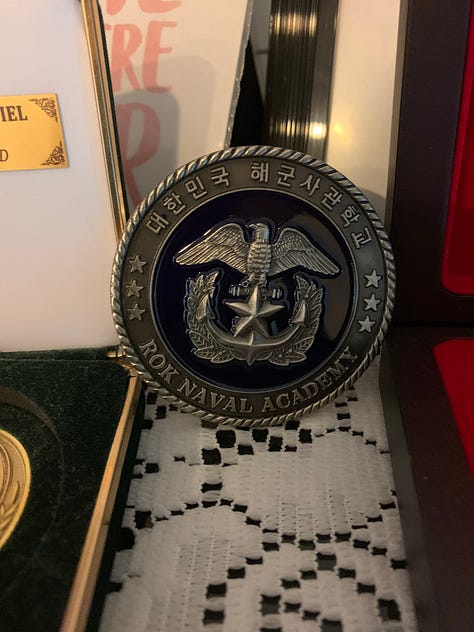
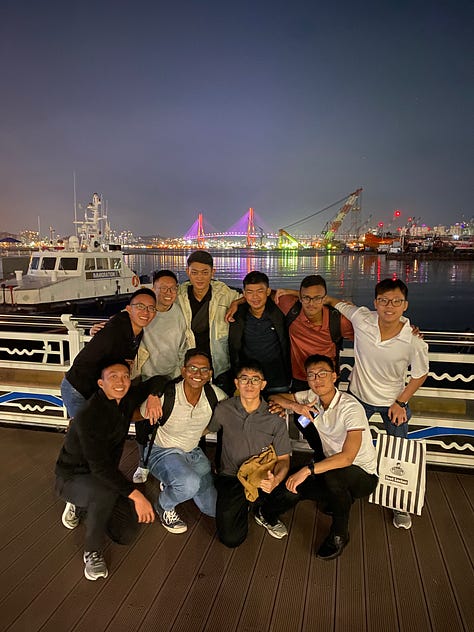
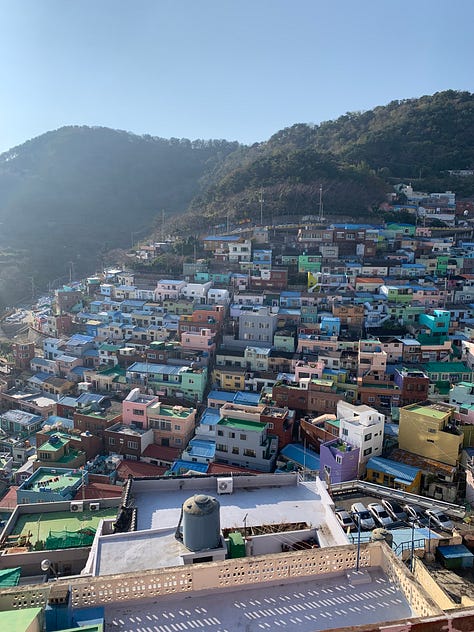
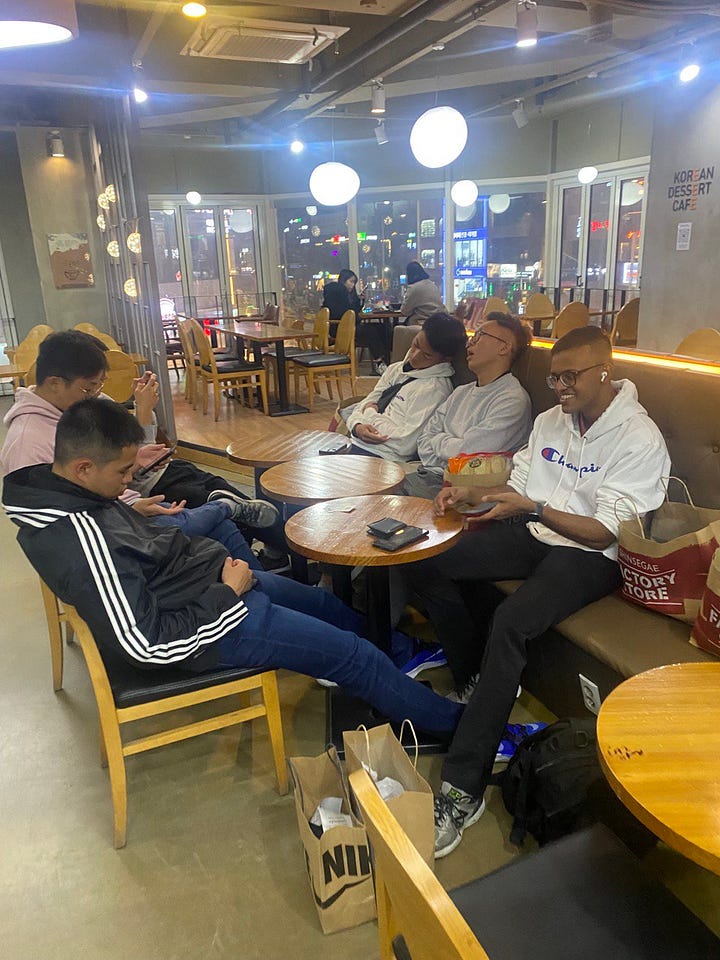

Brunei was crucial for the RSN to participate in Exercise Pelican, an annual naval exercise held between Brunei and Singapore. Not as happening as Korea, but it represented the last leg of our trip :) and finally reaching back home.
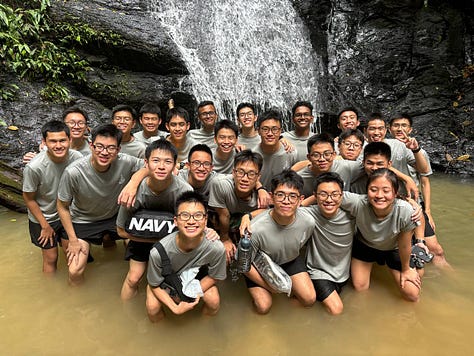
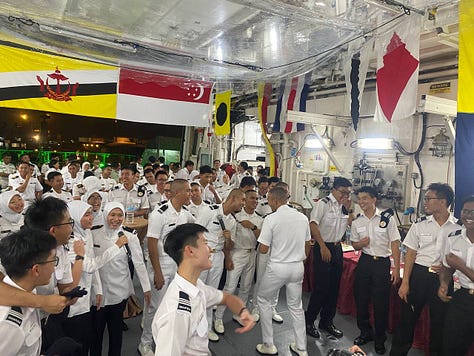
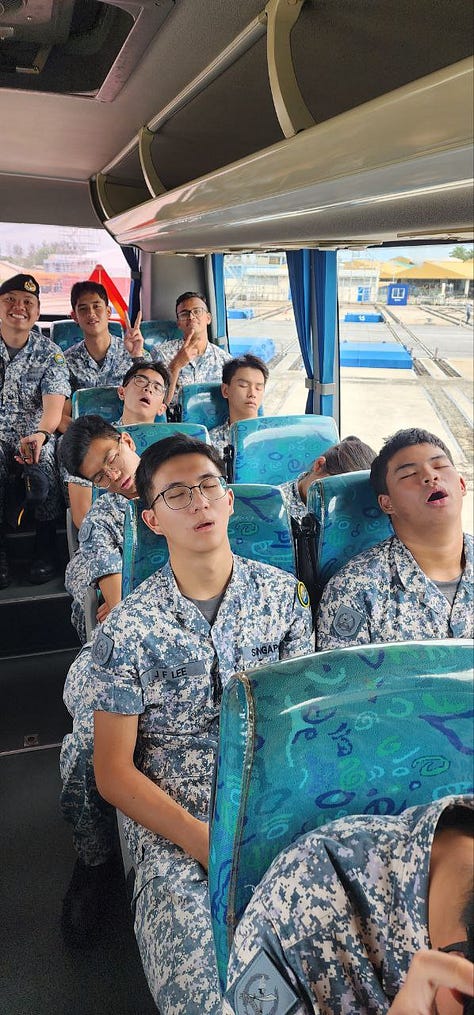
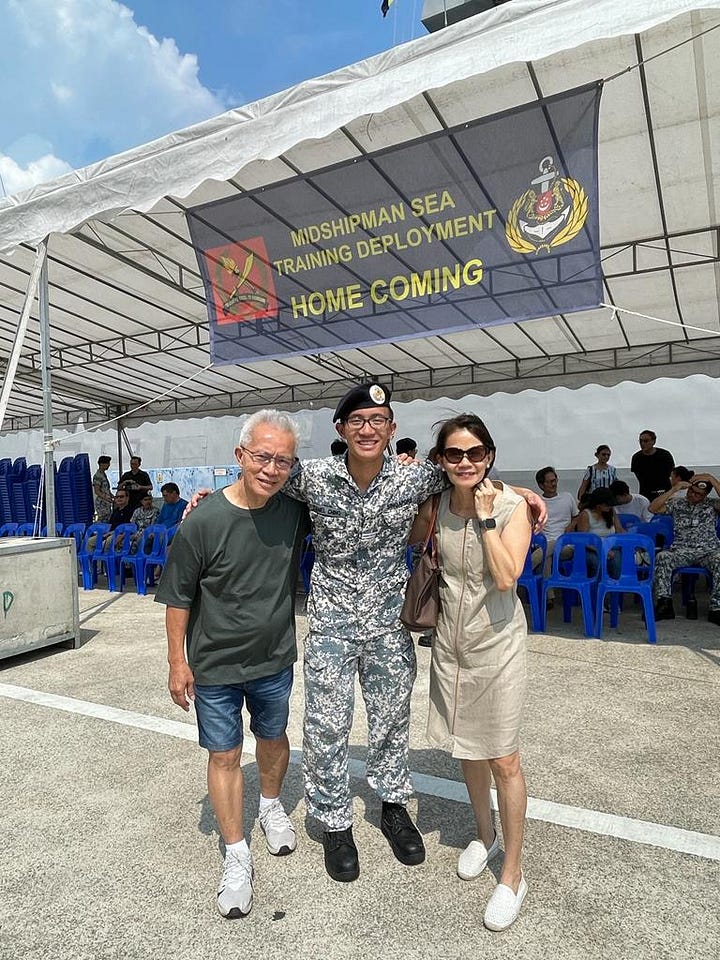
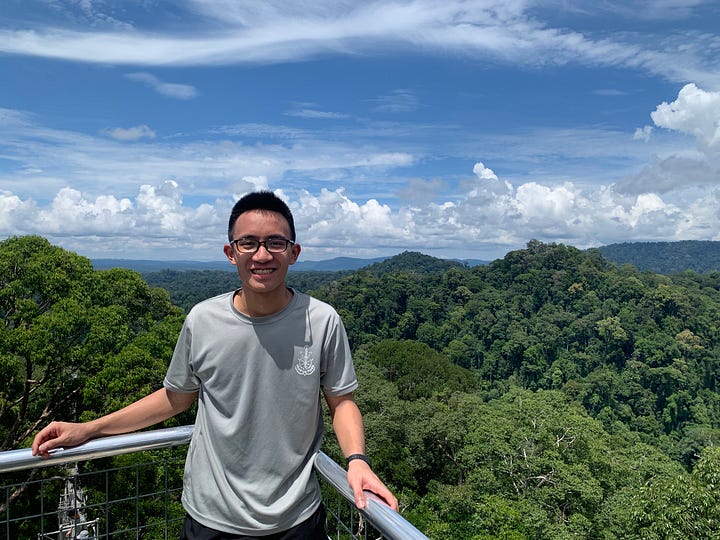
Looking back to push forward
Impermanence
Many things are fleeting. This year has made that much clearer. For one, bookouts are extremely fleeting—just 48 hours (on most weeks)—then it’s back to another 5 long days in camp again. Actually, 5 days and nights, because we go in on Sunday night and come out Friday evening.
Happiness is fleeting: being too contented with where I’m at one day and the pain of having privileges taken away hits harder the next, especially when punishments given out by instructors are seemingly arbitrary.
Fitness is fleeting: there’s no control over the conditions that I operate in. Lack of sleep means reduced recovery periods, which translates to being more susceptible to falling sick.
On rejections, choices and uncertainty
I made a conscious choice to balance between MIDS Wing and college applications. This meant that I couldn’t optimise completely for either, I would just have to try my best at managing both. Prior to joining OCS, I didn’t know whether I could handle it, but I made it in the end (i.e. submitted application package before I sailed).
But I received news that I got rejected from my early admit round.
It sucked. Especially when I spent countless hours in bunk and over bookout fussing over what to write about, how to improve x sentence, fit y more concepts in. Especially when I knew I could have chosen to completely focus on MIDS, bumped my course ranking up a little (yes we do have awards at the end of our course) and maybe even clinch some award. Especially when I went through the stress and dread of two uncertainties: one, whether I could have optimised further for my college applications and two, how bad the conditions were going to be on the sail.
And this made me question the actions that I’ve done since entering JC1 (Grade 11)—taking a step away from the “conventional”, not pursuing any leadership or sporting opportunities, to explore life outside of school. Many good friends of mine looked at me incredulously when I shared with them that I’ll be quitting cross-country and opting not to run for council. Many of my friends who stuck to this convention has since won national awards (in leadership and all-round excellence hahaha), clinched scholarships and excelled at OCS7. Oh yes, and they’ve had placings in colleges I was rejected from the previous cycle (‘22-’23).
Was it worth it? I don’t know. More often than not, in that moment of rejection, it seems unfair and altogether a bad decision that I’d made. Of course I could say that it’s naive to feel so fed up about all these things that don’t matter in the long run (uni placings, awards) but that’s just a form of escapism for the feelings that I’m experiencing in the now. Dealing with them daily in a culture of comparison (Singapore, OCS) doesn’t help.
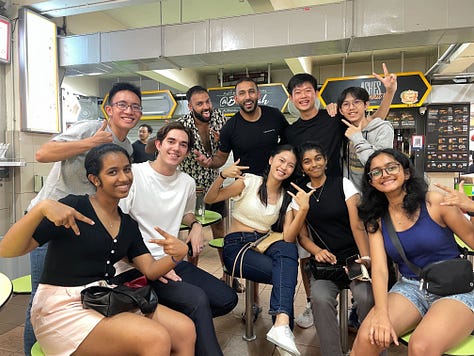
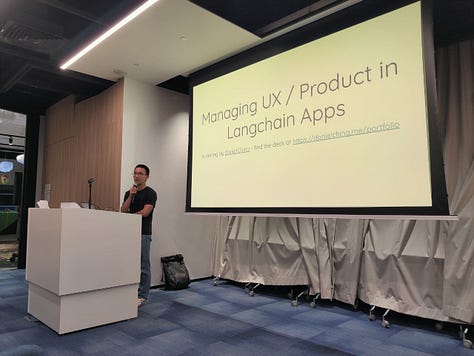
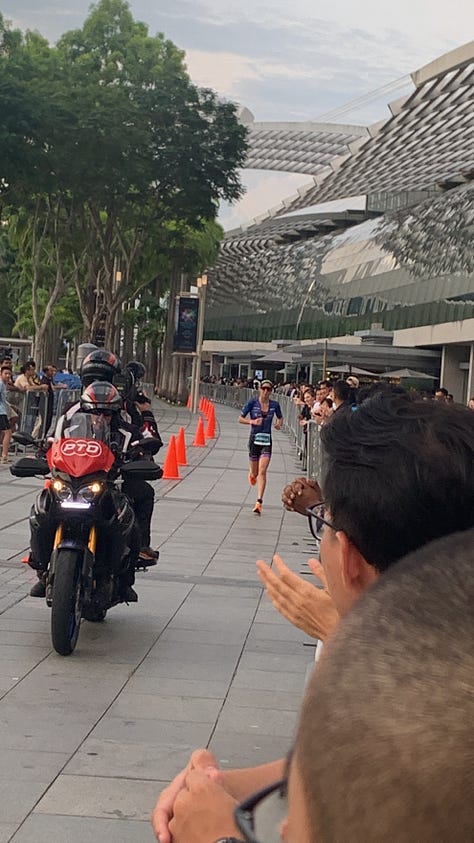
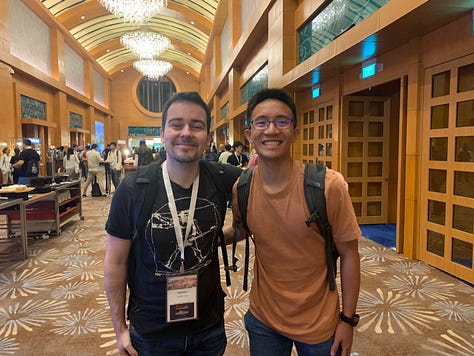
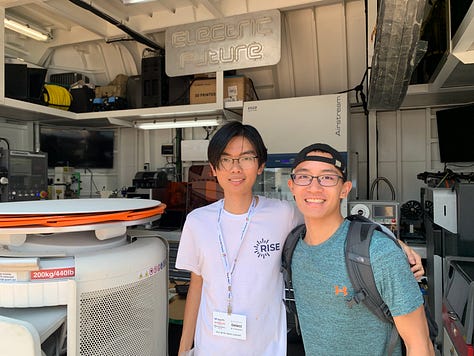
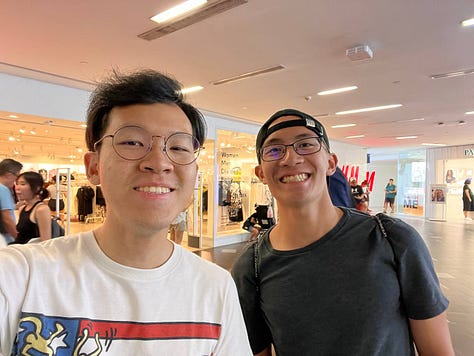
Willing myself on without defined metrics to incentivise myself is hard. But I’m also reminded that this journey (of writing, creating, reflecting publicly) has brought more serendipity than I’ve experienced. If I’d never quit cross-country, yes maybe I would’ve received some nice metalware, but I wouldn’t have had the pleasant surprise of cold emails that originated from an article I’d wrote to help myself.
Pushing forward
This year, things will settle down as I serve another year of National Service. It seems crazy that just one year ago I was having the time of my life in New York, yet now I’m here, writing this on my bunk bed in camp.
A theme I have for this year would be from the song “Keep Making Me” by Sidewalk Prophets. It speaks of constant moulding—often extremes that one has to be subjected to—to reach the end state.
I’ll be diving back into AI in my free time, reading up on physiology and running a lot more (hopefully). Stay tuned for my next newsletter, approx. June ‘24!
Cheers! Have a blessed 2024 ahead :)
BA = breathing apparatus suit, approx ~17kg weight.
For a little more context, all Navy personnel who were going to sail would have to go through a Fire Fighting / Damage Control course. The rationale being: out at sea, if something did happen on board, we would have no one to save us but ourselves. This was preparation for the eventual deployment sail from October to November.
Anecdotes cannot be shared in full due to operational security! Countries in question are specifically left out because of this reason.
There was one instance where not one, but three military vessels from other countries which were tailing us. At 2am (when I was in temporary command of the ship), one of the vessels started approaching our frigate. Since it was pitch black at night, you could only visually make out the lights on the horizon getting bigger and closer. That made me wide awake, that threat of looming danger.
Thinking too deeply about something without focusing on the task at hand could cause trouble sometimes too. I was reflecting about what the intention of going to college was in the first place (since there was so much time devoted to apps), so much so that I nearly jammed a .50-caliber (12.8mm, one round=size of palm) gun with a drill round while practising technical handling.
It was either 8am-12pm, 12pm-4pm, 8pm-12am or 12am-4am. At any point, there would be one group doing this. This also meant that days when we were doing the 8am-12pm shift, we would also have to report (close up) from 12am-4am.
OCS (Officer Cadet School) is made up of various wings. So the three broad wings that NSFs can get posted to are: army, air force and navy. Army is further split into various units such as artillery, infantry, motorised infantry, armour, etc. For each wing/unit, there are different awards, based on course ranking (a mix of tests, leadership capability, physical fitness, etc. that I cannot remember offhand). The most prestigious is the sword-of-honour (SOH), which only one cadet can receive, and the others (top 10%) are sword-of-merits. In this case, this friend of mine clinched the SOH.


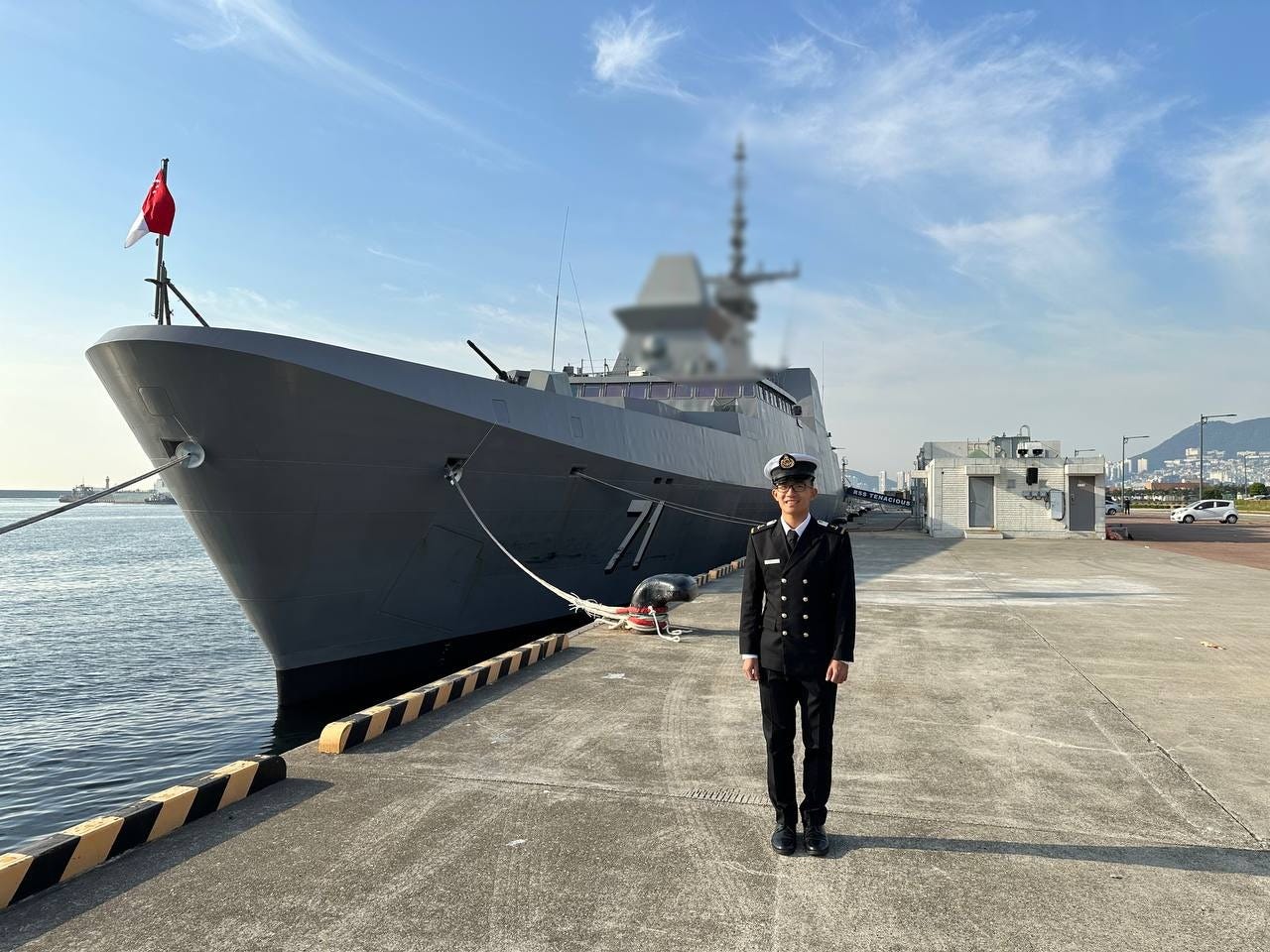

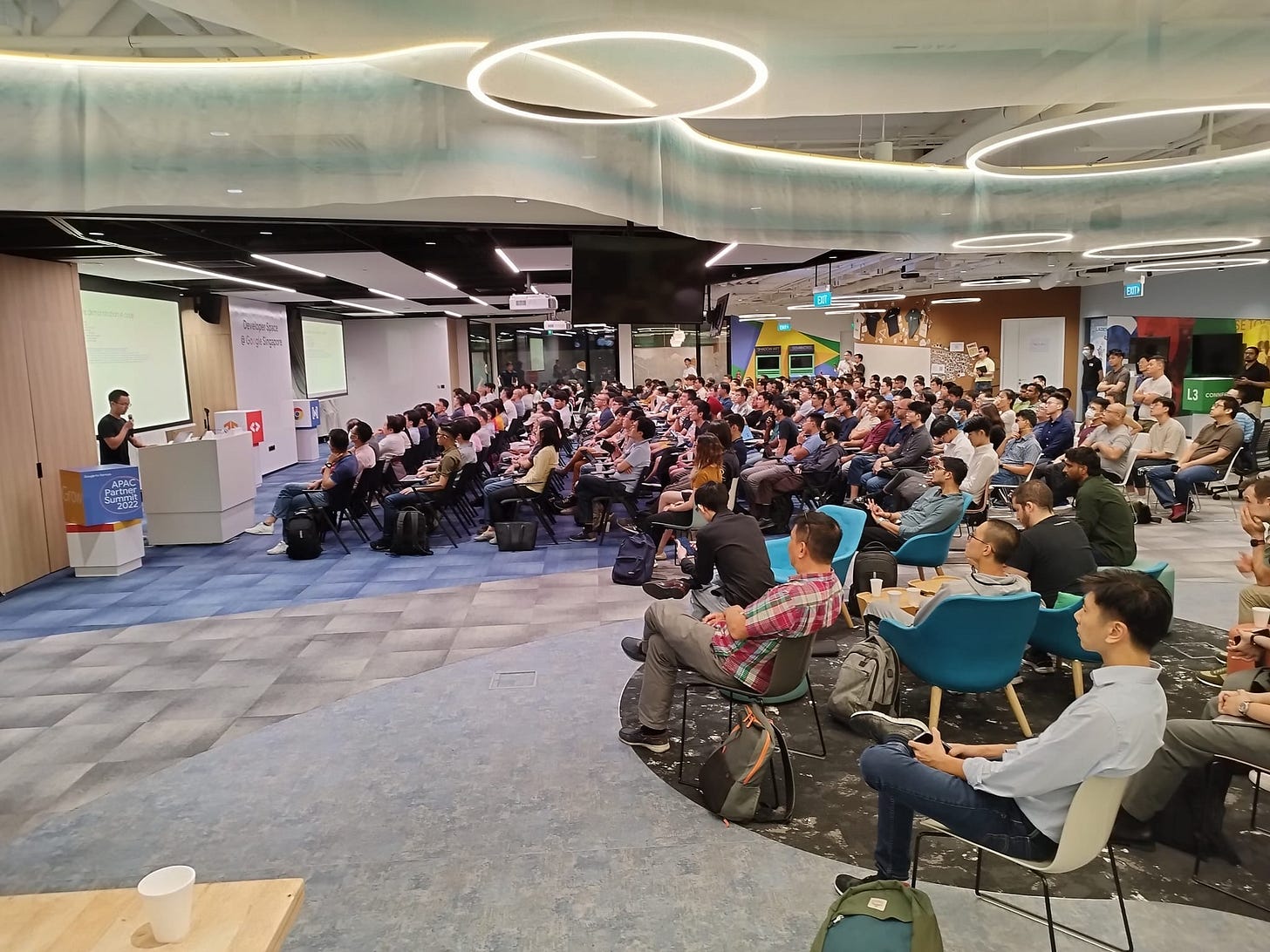
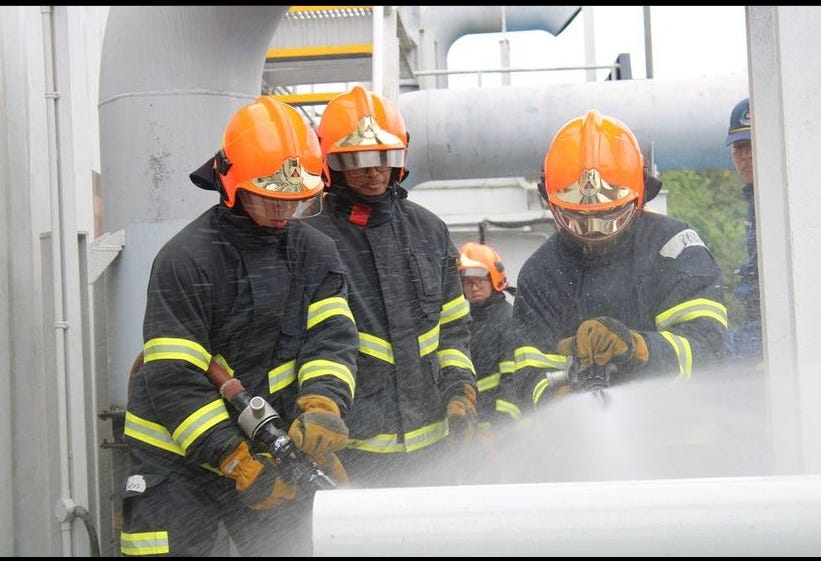
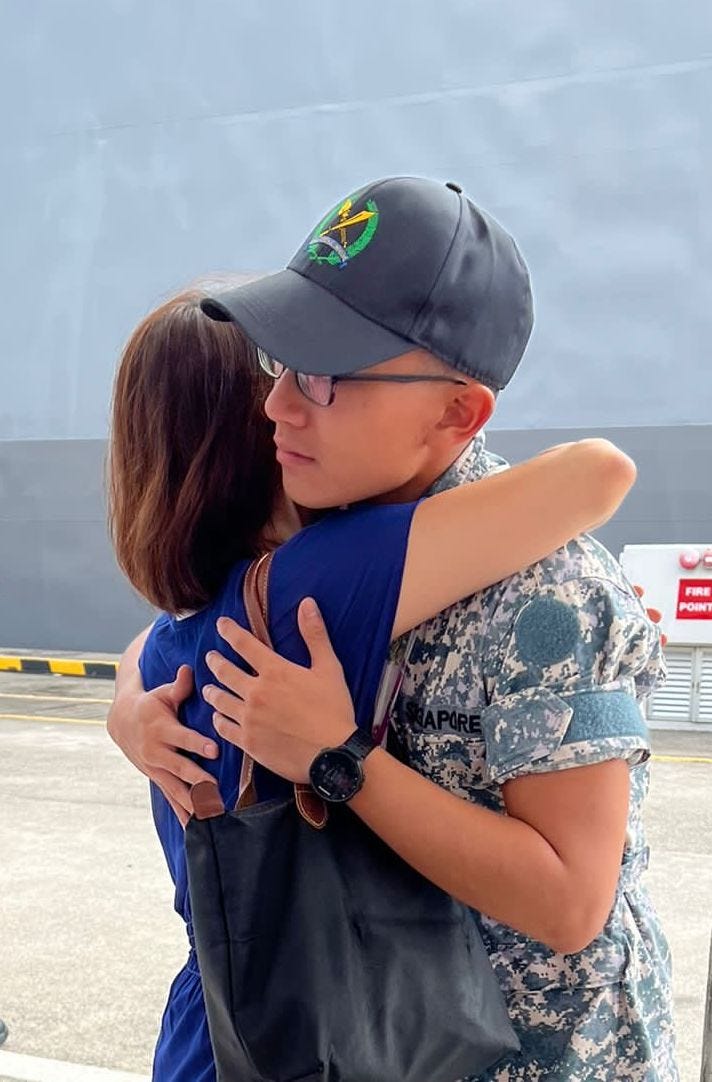
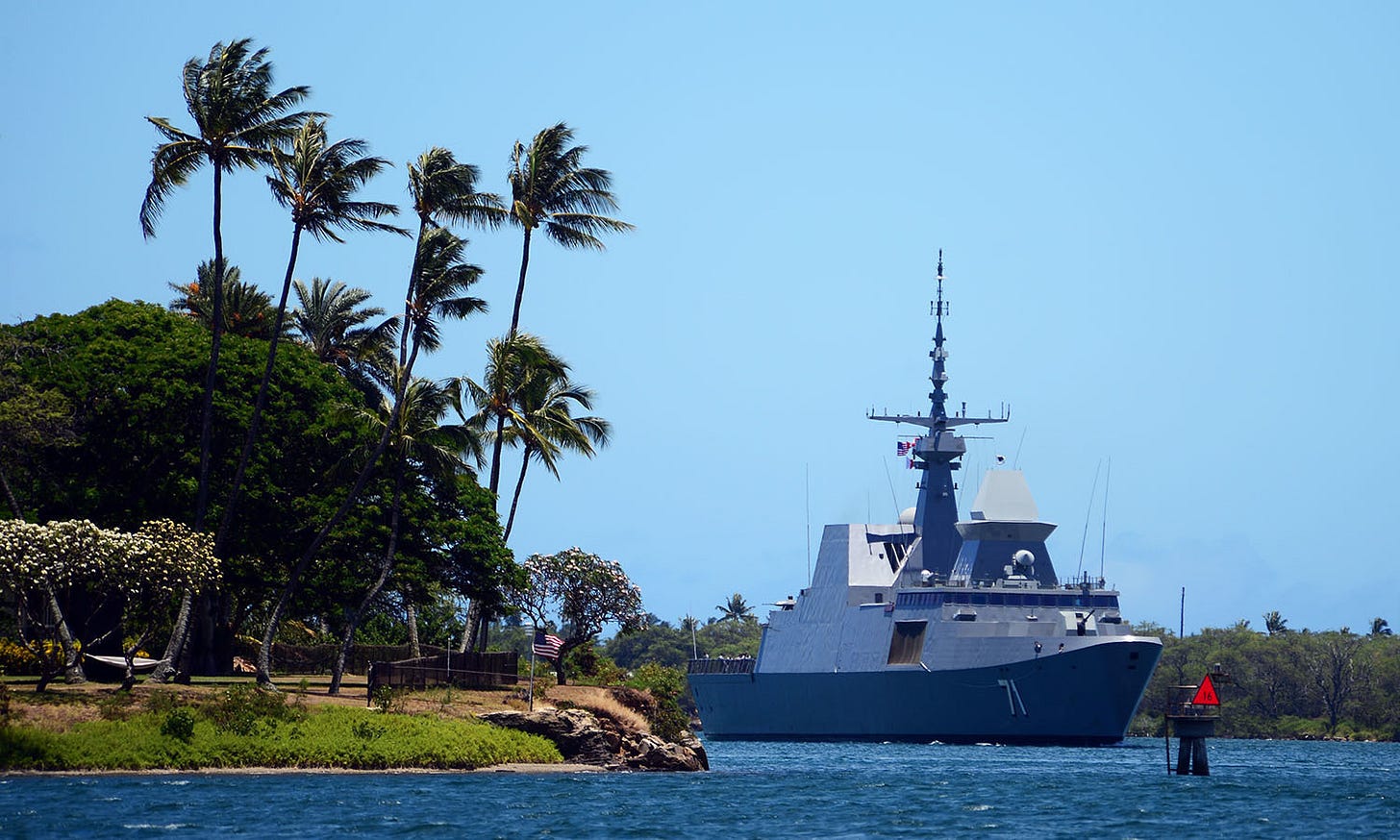

Epic stories, epic post. Proud to call you my friend. I think you truly are making the most of NS, and these reflections I think you'll look back on someday and see how valuable they were.
Fantastic update! Proud of you!